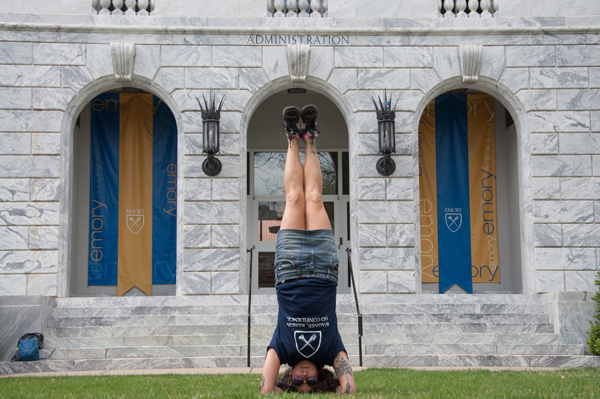College faculty will finish voting tomorrow on whether or not they have confidence in University President James W. Wagner. And in the midst of awaiting the result, students have begun publicly expressing their views.
A “Keep Wagner” online petition created yesterday received almost 700 signatures by press time Thursday evening. Meanwhile, the Student Re-Visioning Committee (SRC) gathered on the Quadrangle Wednesday to urge faculty to vote “no confidence.” The SRC is a group of students that formed in opposition to the department changes announced last semester and that has protested since the fall.
Supporting Wagner
The petition, available at KeepWagner.com, went live Wednesday night and is directed at the University Senate and Board of Trustees. It states that the signers have confidence in Wagner’s ability to lead the University despite his past mistakes.
“Give him the opportunity to foster an environment in which we can create, preserve, teach and apply knowledge in the service of humanity,” the petition reads.
Potential signers of the petition have to provide their first and last name as well as their email. The entire list of the latest signatures is available on the site.
The signers include members from various sectors of the community, including faculty, alumni and students.
The creator of the petition, a male student who requested anonymity because of his affiliation with a student organization, said he became frustrated after seeing “Stop the Cuts” campaign materials across campus at the end of March.
“It was a very small minority of students being very, very vocal, and I felt like they were being misrepresented as a much larger segment of the student population than they actually were,” he said.
After that, the student made a private website but decided to make the page public to “get everything going” once he saw the Dooley statue in Asbury Circle covered in “no confidence” fliers. He said covering the Dooley statue was “metaphorical” and those who did so defaced something the University holds “sacred.”
The petition also has a related Twitter and Facebook page where the creators encourage followers to share their reasons for supporting Wagner. In addition, the creator placed “Keep Wagner” fliers across campus.
The goal of the petition, the creator said, is to show that many students do, in fact, support Wagner. Hopefully, national media will report on that, he said.
“While Wagner is a very convenient scapegoat … [these incidents] can’t be directly attributed to him,” the creator said. He also said Wagner has set a “wonderful vision of a highly-inclusive campus.”
Today, the creator implemented a moderating system due to an influx of fake signatures, like the names “Kim Jong-il” and “Jefferson Davis.” A little more than 200 emails of the signers were unverified.
Goizueta Business School junior Trevor Pirro, who signed the petition, said he hopes the petition will provide Wagner with another channel of support.
“Let’s be real, everyone makes mistakes,” Pirro wrote in an email to the Wheel. “President Wagner has continuously led Emory to be recognized as an elite institution, and I am still confident that he is right for the job. Everyone who supports him should let it show.”
College junior Raghvi Anand, another signer, wrote that even though she does not agree with Wagner’s actions this year, those mistakes are not an “accurate indicator” of his leadership.
“Removing [Wagner] from the picture of not the solution to addressing all of these problems,” Anand wrote in an email to the Wheel. “Removing Wagner will only leave Emory’s campus more vulnerable at a time where so many issues need to be resolved.”
The petition’s maker hopes that about 30 percent of the student population will end up signing the petition.
Opposing Wagner
Patrick Blanchfield, an SRC member and sixth-year Ph.D. candidate, said the Student Government Association (SGA) legislators denied students an open vote on a vital issue and then supported the administration through a privately-launched petition. Blanchfield referred to the SGA bill that would have added an option to vote “no confidence in the direction of the University is headed” to the student government leadership ballot. The SGA legislature failed the bill.
“In other words, they first failed in their duties as leaders and representatives by working to silence student voices and then turned around and spoke in that very leadership capacity to provide the appearance of a credible ‘student voice’ in support of administration,” Blanchfield wrote.
SRC members wore T-shirts with an upside-down Emory logo and the words, “Wagner, Resign / No Confidence,” during a gathering on the Quad on Wednesday at noon.
Katherine Bryant, a fourth-year neuroscience graduate student and an SRC member, said the group also handed out flyers to prospective students and their parents at the event.
“We know it’s very politically difficult for faculty to come out and speak up when they question the presidential leadership, so we wanted to make sure they knew students supported them in choosing no confidence,” Bryant said.
Blanchfield said he feels faculty should vote no confidence for Wagner because he has “shamefully damaged the credibility of Emory as an institution.”
“His track record of leadership shows a profound disregard for shared governance and transparency in community dealings,” Blanchfield wrote in an email to the Wheel. “Can we really trust a leader of such little legitimacy and poor judgement with the future of our university?”
Blanchfield said Wagner’s editorial revealed a “scandalous ignorance of history and deeply-troubling blind spots.”
Faculty voting will end today. Voting has taken place since Monday via electronic ballot.
–By Karishma Mehrotra
The Emory Wheel was founded in 1919 and is currently the only independent, student-run newspaper of Emory University. The Wheel publishes weekly on Wednesdays during the academic year, except during University holidays and scheduled publication intermissions.
The Wheel is financially and editorially independent from the University. All of its content is generated by the Wheel’s more than 100 student staff members and contributing writers, and its printing costs are covered by profits from self-generated advertising sales.







“The creator of the petition, a male student who requested anonymity because of his affiliation with a student organization, said he became frustrated after seeing “Stop the Cuts” campaign materials across campus at the end of March.”
So, uh, a member of the SGA? Someone who thinks “Give [Wagner] the opportunity to foster an environment in which we can create, preserve, teach and apply knowledge in the service of humanity” is persuasive writing?
Sounds a lot like somebody who has might write with similar elegance that “I believe in President Wagner and his ability to lead us and join us in our path to better days.”
That would be Ashish Gandhi, BTW.
whoever he is he is almost as beautiful writer as president wagner himself
Obviously SGA. . . Ashish or his trusty sidekick Matt Willis.
Also, look at the signatures. . . predominately whites and greek affiliated
So, a white signature should count for less than what…..?
It is okay. . . don’t freak out. Whites have never been counted as 3/5s.
yeah, we should ignore people’s opinions based on their skin color and affiliations!
Not ignore. .. pay attention to the fact that most of the signatures are not people of color and not affiliated with Greek Life (including the alumni). By the way, people of color at Emory are constantly ignored based on the color of their skin and because they are not a part of certain groups (which have historically been for whites at Emory).
Check out this post from Emory Secrets: “#2043: I sprinkled in 70 fake signees to the “Keep Wagner” online petition before e-mails started being confirmed. Each signature is the name of a victim of the Jonestown massacre…because people are straight drinking Kool-Aid.”
The Keep Wagner petition is straight bullshit, put together by people on the SGA who don’t have the courage to take responsibility for it – and with good reason, since they blocked the student vote earlier this semester and are *still* carrying water for admin. Stooges.
The person in charge of the petition is not on SGA.
Nice fearmongering though.
Uh, are you reading the Keep Wagner page on FB?
Winston Hanks of the SGA’s Constitutional Council is falling all over himself saying how it wouldn’t matter at all if the petition was started by an SGA member. He protesteth far, far too much.
But if you know who’s behind it, by all means, share.
It doesn’t matter who’s behind it. And even if it is SGA, they’ve worked with the administration more than anyone and are likely to have a better understanding of the situation than most.
Really? Then why do they seem to think that a faculty vote is binding? Because that’s damn ignorant.
The SGA is a joke. I’ve been to enough meetings where the cuts have come up and they spend most of the time playing games on their phones.
Do you really think that the SGA has a better grasp of the cuts than the AAUP and the faculty who have voted multiple times to investigate them and reformulate governance? The SGA actually knows more about the college restructuring than faculty, because of the close access the SGA maintains with President Wagner’s office? Are you huffing paint?
Why? So he can get harassed on Facebook?
The SGA also has gotten a pretty sweet multi-million dollar kickback from administration this year. I think we’d all agree that financial interests can sway anyone’s appraisal of their funder’s job performance. So, yeah, it does matter whether and SGA member created the petition.
If he blocked his fellow students from
Voting only to launch a private position in Wagner’s favor he deserves to be called out.
Those protester should stop protests. Which university wish to develop the academic that they are not good at!!! think about it, visual arts is nonsense, it does not matter to have it or not. Emory is good at neuroscience, we should have this on campus instead of something useless called “visual arts”,
Yes! Only Leadership of Right Logic James Wagner Thought Bring Glorious Future to CocaCola University. Smash the Snake Heads of Protestors and Their Vile Professor Running Dogs!!!!
aaaa: You are so right. Those of us from Beijing only want pre-med and business.
The vote will be rigged and unfair to keep him there. Emory has an history for being unfair
God I hope not.
Agreed RE: the unfairness, this institution is – and has been – a hot mess. Hopefully Wagner goes, takes his upper-level staff with him, and we can clean house and rebuild. So much needs to be done – about race, about workers’ rights, about Atlanta outreach, about economic justice, and more, but no change is possible with Jim Wagner in charge.
You are delusional. That is never going to happen. No one is going to pay for all that. Ben Johnson and the board are probably even more conservative than Wagner. They could care less about your liberal agenda. They’re also more skeptical of financial aid than Wagner is. If Wagner leaves, the next president is just going to make deeper cuts. Better to get it out of the way at the start of your term, because you can just blame the cuts on a financial situation you were handed from your predecessor. Plus the supreme court is going to end affirmative action once and for all. My relative is friends with a Justice.
Oh wow so you have an inside scoop in SCOTUS and you’re sharing it in the comments section of a college newspaper? Wow bro you got connections and credibility to burn
Did you ever know that you’re my hero?
And everything I would like to be.
I can fly higher than and eagle.
Cause you are the wind beneath my wings.
Fly, fly, fly high against the sky,
so high I almost touch the sky.
Thank you, thank you,
thank God for you, the wind beneath my wings.
What an absolutely delusional nutcase this person is. Absolutely sickening. Nobody supports your BS liberal agenda, now get over it or GET OUT!
Oh shit wait till that commenter reads that you called him a liberal! Oh shit oh shit oh shit that’s going to be humiliating for him. By the way, you’re totally right – no one, and I mean NO ONE, supports this point of view. I mean, except the 133 faculty who voted no confidence… but… let’s see… if you multiply that by 3/5ths, what do you get… that’s only 79.8 people!
The previous poster is a moron. Slaves never got to vote. The issue wasn’t that their vote only counted as 3/5ths of a white person’s vote. Go read up on US history.
Oh my goodness, you people act like it’s a dictatorship.There are committees composed of faculty, students, and alums alike who are charged with guiding the administration in these difficult decisions. And i dare say there are few presidents who would be as open to dialogue as this one. Who of you have run for office, nominated yourself to be on a committee, or attempted to be part of the decision-making process you so despise? Isn’t it more effective to create change during the process rather than just complain about it? If you truly believe in your cause then commit to it and run for office. Join a committee that guides the administration in these decisions. Run for SGA office (it’s not for the faint of heart). Ask how you can join in the discussion outside of your program. There are ample opportunities to get involved should you be willing and I guarantee the university is welcoming of graduate student involvement. But be prepared, it takes a lot more commitment than signs, words, and t-shirts. In the meantime, please keep in mind that those of us who have opinions different than yours have respected your freedom to express them and ask that you do the same.
Meredith it is largely because the university’s committee structure was bypassed and the CFAC violated Emory’s own bylaws that Wagner is looking at an NC vote and the AAUP is demanding an investigation. Apart from making fun of activists are you actually following issues in campus?
Meredith, the things that you are suggesting that should be done are exactly the things that were ignored and why there are issues with the administration in the first place. There was no consultation, there was no shared governance, there was no transparency and there was allowance for being a part of the decision-making process. There was not even adherence to Emory’s own rules. There certainly was no welcoming of graduate student involvement. There was in fact the exact opposite, hence what has been an ongoing effort to give students a greater say in the decision-making process.
The suggestion that all that has been done by grad students is put up signs and make t-shirts is extraordinarily false. In fact, these grad students you disparage went before the SGA multiple times requesting that the undergrads be given the right to voice their own opinion, be in positive or negative, in a vote of their own to answer if they were happy with the direction of the college. They asked the SGA to welcome student involvement in the discussions that are happening on campus. This was rejected with the reason given that undergrads either do not care about these issues or are not informed enough to be trusted to vote.
Hi Billy. I actually worked on all those things you mentioned while in graduate school. My agenda, actually, was to create a resource for graduate students to participate in discussions on campus and I felt strongly that most graduate students had no clue of resources available to them. So I ran for office and sat on committees to work towards advocating on our behalf. It wasn’t easy but we made great strides. I was actually president of graduate SGA and worked closely with many of the SGA folks in order to achieve compromise. And while doing so I also worked with the administration in various capacities including university senate. I’m sorry you feel there has been misrepresentation of late. I can only attest to my experiences but I promise you I had a list of things I sought to change and while it was a process, president Wagner et al were more than willing to work with me and others who felt strongly about various issues. And to the person who asked whether I pay attention to issues on campus, hopefully this answers your question.
Meredith, I’m actually not getting the sense that you actually are on the same page about the issues at play here. The committees and consultative bodies in question are the Financial Advisory Committee (CFAC) and GovCom, the primary university faculty governance committee. CFAC was a subcommittee that was supposed to report to govern, and was tasked with dealing with investment and expenditure issues in the wake of the 2008 market tumble, but its mandate was changed with the arrival of a new dean and it ceased reporting to Govcom. The chair of CFAC has admitted to the Wheel about “lying” about his committee’s activities – specifically their review of unsuspecting colleague’s salaries and their departments futures. Evaluations were carried out without the programs and individuals in question, and without possibility of appeal. Wagner himself has insisted that the process was legitimate and “final”, but the University’s own bylaws were clearly violated and principles of shared governance have been violated as well.
Can you speak to these issues at all?
I’d be interested to learn more about the relationship that Wheel contributors/leadership have with Ashish Gandhi and Company. The actions of trying to swing an election in Matt Willis’s favor by giving him evidence to challenge the results, taking no editorial stance on Ashish Gandhi generalizing the experience of all African American students/implying that only African American students were impacted by Wagner’s comments, and withholding their identity (because 99% unless he issues a public denial: Ashish Gandhi’s part of this formally or informally) when discussing the creation of the petition for this article, as a whole smell bad to me. I think that rather than regurgitating the talking points of the petition’s creator(s), The Wheel should require sources with the quotes in order to put readers in a better position to evaluate the creator’s claims.
Looking at the first signatures on the petition and the fact that it has the same font/design as the Willis campaign website and gender pronouns, at the bare minimum the creator is affiliated with ATO. Seeing the very specific references to happenings in SGA written by the facebook page, it’s more likely than not that the petition was originated by Ashish Gandhi and/or Matt Willis.
I know it’s hypocritical for me to anonymously attack the creator of the petition for hiding his identity. I think these points are important. And I mean, if I wanted to be in a position where it would be normative and ethical for me to publicly take a stand on issues then I would have run for SGA President.
The Dooley statue is sacred?
Apparently. Also, “defacing” is apparently the same thing as “taping flyers”.
This is very fascinating, You’re an overly professional blogger.
I have joined your feed and look forward to in the hunt for extra
of your wonderful post. Also, I’ve shared your site in my social networks
Excellent web site. Plenty of helpful info here.
I am sending it to several pals ans also sharing in delicious.
And of course, thank you in your effort!
Have you ever considered publishing an e-book or guest authoring on
other blogs? I have a blog centered on the same subjects you discuss and
would really like to have you share some stories/information.
I know my readers would appreciate your work. If you’re even remotely interested,
feel free to shoot me an email.